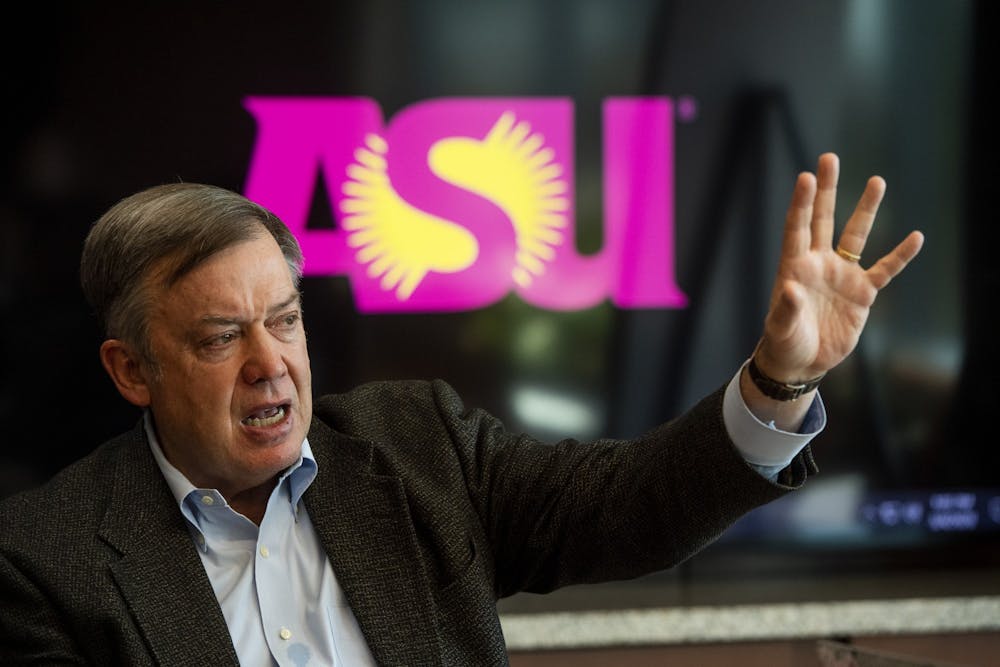When ASU President Michael Crow crafted a letter to Gov. Doug Ducey seeking financial support for a University venture to alleviate Arizona's demand for medical equipment — a widespread need amid a nationwide shortage — the governor declined.
While the University said Ducey declined the proposal, Patrick Ptak, the governor’s spokesperson, said that the matter is “ongoing,” but he did not give specifics or elaborate on the possibility of ASU receiving state funds.
Ducey's rejection of the proposal was first reported by The Arizona Republic and later confirmed to The State Press by ASU spokesperson Katie Paquet.
The University's PPE Response Network and COVID-19 Rapid Response Initiative, which would help provide Arizona with medical equipment produced by ASU and other contributors, would require $5 million worth of funding, Crow said.
If at least a portion of that money came from the state, it "may also be possible to obtain additional third party support for such an initiative," Crow added.
The Republic reported that Ducey's staff told a lobbyist working for ASU that the governor believes hospitals should fund personal protection equipment.
Crow’s letter outlined ASU's COVID-19 work, which includes both providing medical equipment and testing. Crow wrote that the University is eager and willing to do more if it receives funding from the state.
Attached to Crow's letter was Arizona's COVID-19 Rapid Response Initiative, an overview for the governor outlining the University's plan to create a decentralized system that would produce and distribute PPE and medical instruments.
"A nimble supply chain will be established that leverages a network of producers, distributors, and entities who have the capability to sterilize and verify medical equipment," the overview said.
A software tool would be developed "for the dynamic communication and management of both supply and demand" that would then be linked with a modeling system in collaboration with the Arizona Department of Health Services and UA, the overview said.
Combined, this effort could create over 5,000 units of medical equipment daily, according to the summary. ASU estimated that an "initial investment" of $5 million would be needed from the "state and/or other sources."
Paquet told The Republic that an "investment from the state would have helped," but that they "understand the state has other priorities right now."
“While ASU’s distributed equipment ‘factory’ is already underway producing the kind of PPE and medical equipment that is in short supply all across the country, we believe a larger effort could also be launched with investment and support from the State of Arizona,” Crow said in the letter.
Crow requested that Ducey “consider utilizing some portion of the discretionary resources made available to you” in order to fund the program that would supply Arizona with necessary medical equipment.
"We at ASU want to make sure you were aware of the work already being undertaken at ASU and the opportunity to expand this model to an even greater scale for the benefit of Arizona," Crow said.
The network, led by ASU’s Luminosity Lab, has created a “factory” for medical equipment. Using resources like 3D printers, the "factory" is producing face shields, test swabs, medical gowns and more.
READ MORE: ASU creates network to aid medical supply production and distribution
The Republic reported that the network has “delivered more than 1,000 pieces of personal protective equipment in the first week,” Mark Naufel, executive director of ASU's Luminosity Lab, said.
At this time, 20 different organizations have requested medical equipment from the network.
Aside from the Luminosity Lab, all the other contributors have yet to deliver any materials at this time, according to a table on the PPE Response Network Website.
All but one of the contributors are from Arizona, with many of them being affiliated with ASU.
Ptak noted that both ASU and Crow deserve a lot of credit for their work so far in helping Arizona and that the governor's office "appreciates that."
Sethuraman Panchanathan, executive vice president of Knowledge Enterprise and chief research and innovation officer at ASU, would lead any future collaboration between ASU and the state, Crow said.
Reach the reporter at wmyskow@asu.edu and follow @wmyskow on Twitter.
Like The State Press on Facebook and follow @statepress on Twitter.

Wyatt Myskow is the project manager at The State Press, where he oversees enterprise stories for the publication. He also works at The Arizona Republic, where he covers the cities of Peoria and Surprise.




